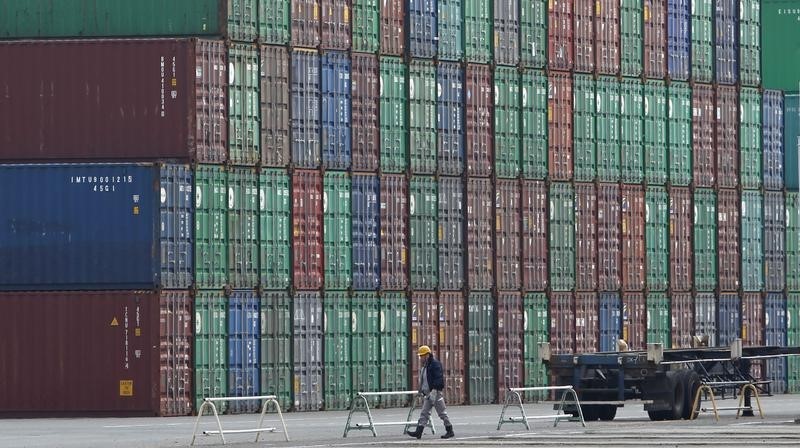By Tetsushi Kajimoto
TOKYO (Reuters) - Japan's exports grew for a third straight month in November from a year earlier, but much more slowly than expected and despite a sharp fall in the yen, maintaining economic policy pressure on Prime Minister Shinzo Abe days after his ruling coalition's big election win.
The 4.9 percent rise in exports was much weaker than a 7.0 percent gain seen by economists in a Reuters poll, slowing from a 9.6 percent gain in October, Ministry of Finance data showed.
Weakness in exports could compound April's sales tax rise which pushed the economy into a recessionary second quarter of contraction through September.
Abe's ruling coalition won snap elections at the weekend, giving the prime minister a fresh mandate to implement his "Abenomics" reform of monetary and fiscal stimulus, combined with structural reform.
Falling oil prices add to the murky outlook, prompting a warning from a top government spokesman about a possible risk aversion spreading to financial markets.
Analysts say the slowdown followed a jump in October exports from one-off factors such as the delivery of ships to Singapore, arguing that exports should remain steady - backed by a U.S. recovery that helps boost output in Asia and Japan.
"Exports are still seesawing," said Takeshi Minami, chief economist at Norinchukin Research Institute. "Falling oil prices will benefit importing nations, but we should also be aware of the fact that they stem from anxiety over the global outlook."
The data followed the Bank of Japan's key tankan survey, which showed business confidence barely improved in the fourth quarter, suggesting a slow climb out of recession despite gains in share prices and a steep fall in the yen.
The yen <USD/JPY> hovered below 117 yen to the dollar on Wednesday, after it hit a 7-year low of more than 120 earlier this month, down about 10 percent since the BOJ's shock expansion of monetary stimulus on Oct. 31. The BOJ is expected to stand pat at a monetary policy meeting on Friday.
Exports to the United States rose 6.8 percent in the year to November, while shipments to China rose just 0.9 percent, slowing sharply from an annual 7.2 percent gain in October.
Exports to Asia, which account for more than half of Japanese shipments, grew 5.8 percent in the year to November, slowing from a 10.5 percent jump in the previous month. EU-bound exports fell 1.3 percent, the first fall in 18 months.
Overall imports fell 1.7 percent in the year to November due to falling oil prices, versus a 1.7 percent gain expected. That helped trim a trade gap by 31.5 percent from a year ago to 891.9 billion yen (£4.84 billion), but still marking a record 29-month run of deficits.

Export volume fell 1.7 percent in the year to November, the first annual drop in three months. Japanese shipments have struggled to pick up because companies have moved much of their production overseas, limiting the gains from a weak currency.
(Editing by Eric Meijer)